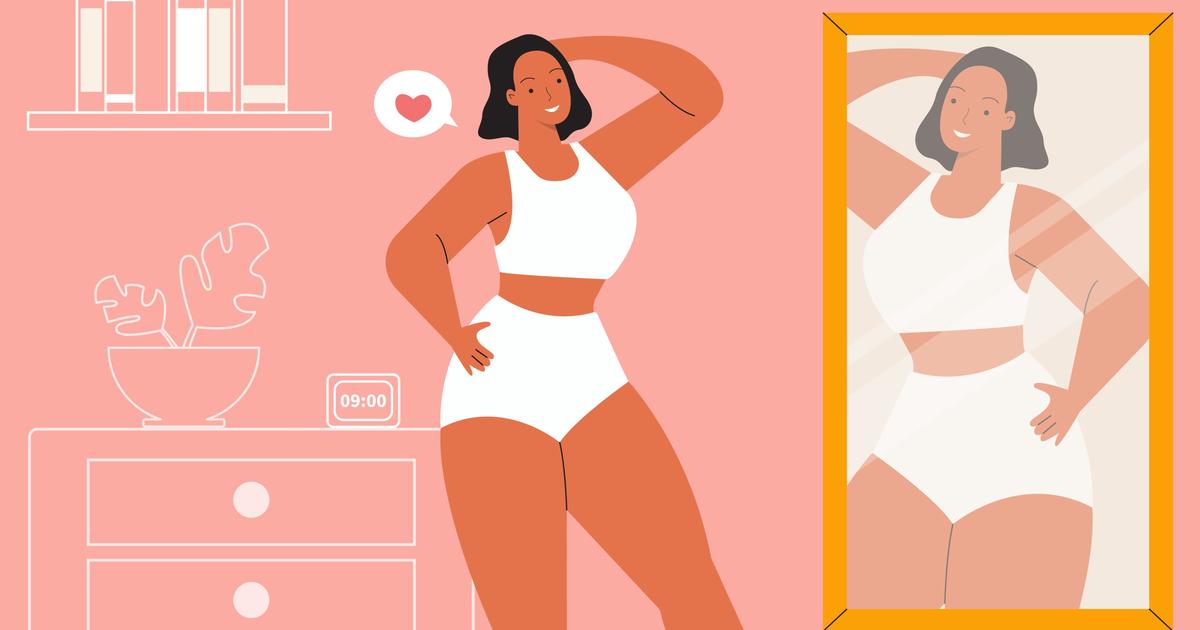Over 17 million posts flock to the bodypositive hashtag on Instagram.
Multiple silhouettes posing proudly in underwear mingle with mantras advocating self-acceptance.
Twenty-five years after the creation of the association The Body Positive by two Americans, Elizabeth Scott and Connie Sobczak (following the death of the latter's sister suffering from an eating disorder), the movement has brought to light bodies once considered "extraordinary".
Plus-size models, such as Ashley Graham, Jill Kortleve or Precious Lee, regularly parade on the Fashion Week catwalks.
New faces embody cosmetics brands, such as the singer Yseult, named ambassador of L'Oréal Paris, or Paloma Elsesser, muse of Pat McGrath Labs.
To read also Benevolence at all costs, body positive: do we still have the right to complex?
Signs of real progress for this fight?
"Initially, body positivism was a militant movement, which fought against the invisibility of fat people", recalls Sylvie Benkemoun, psychologist, psychotherapist and member of the Gros (Focus group on obesity and overweight).
“Unfortunately, I don't believe it has changed people's view of overweight or obese people.
Its original definition has been diverted and affects more “standard” bodies today.
The body positive fights against a certain perfection of the body, but not specifically in very fat people.
Rather, we are targeting what were considered imperfections, cellulite or stretch marks, for example,” she observes.
In video, "Style Not Size", the positive body bet of two fashion influencers
A hackneyed concept
An observation also shared by Gaëlle Prudencio, body positive and anti-grossophobia activist, author of the book
Proud to be myself,
published in 2021 (Éditions Leduc).
“We applaud people with so-called “standard” bodies, who take pictures of themselves to show that they have rolls when they sit down.
Whether I am standing or sitting, you will always see my rolls!
However, when I expose myself in a bathing suit on social networks, I am told that I am apologizing for obesity, whereas my message is the same”, she laments, acknowledging however that “this movement made things happen.
I appear in a television ad (
for the Garnier brand, editor's note
), I would never have imagined this ten years ago!
But we must take up the true definition of body positivism and not make invisible the people who really suffer discrimination on a daily basis in society.
It is not a question of saying: “I am pretty, I like myself, I feel good about myself”, but rather of asking oneself: “When I go out in the street, do I feel security from the eyes of other people”?
The test already begins in front of the mirror for some, because women are the first to judge themselves: 48% of over 40s and 52% of 30-39 year olds admit to taking a "rather severe and demanding" look at themselves. (1).
We must take up the true definition of body positivism and not make invisible the people who really suffer discrimination on a daily basis in society.
Gaelle Prudencio
Even if celebrities and influencers have contributed to the liberation of speech by appearing without filters and without editing on social networks, the reality is quite different behind the screens.
In France, two out of three women say they have a complex about their bodies (2).
Worse still, for 79% of them, social networks accentuate this malaise.
“Challenging unique and totalitarian standards inevitably upsets codes and helps to reduce the pressure exerted by the dictates of beauty.
But I do not believe that it is a revolution for the moment , estimates Catherine Grangeard, psychosociologist, psychologist and psychotherapist.
“Certainly, displaying one's physical characteristics on the public scene is progress.
It is an enriching perspective, which can free us and allow us to defocus,
but this remains an exception.
Deeply rooted injunctions still persist, such as that of thinness, and there remains a certain fatphobia in society, ”she notes.
"real women"
At a time when the idealized vision of bodies is asked to be diversified, the major players in the beauty industry are aligning themselves.
Since Dove launched its For all the beauties campaign in 2005, many cosmetic brands have followed suit, such as Fenty Beauty, Glossier and Revlon, to name only the most publicized.
However, less than a third of French women recognize the efforts of brands to highlight models of “real women” in beauty product advertisements (3).
The 50-70 year old generation judges that these "do not reflect reality" and still favor muses "too young", "too perfect", complain that the photos are "too retouched" and regret not seeing of women “with weight problems” or “wrinkles.”
Consumers are no longer fooled, at a time when shapes are becoming a selling point.
Recently, Norwegian model Karoline Bjørnelykke revealed that she wore a padding jumpsuit to fit into clothes from a “plus size” fashion brand during a photo shoot (she says she is a size 38).
"Curvy women should know that models are often retouched and that they cannot look like them", she revealed, accessories in support, in a video that has gone viral on TikTok, denouncing these "unrealistic bodies" which are born in industry.
For their part, stars elevated to the rank of body positive icons have expressed some reservations.
The actress Barbie Ferreira denounced this pressure to have to "be a person who loves herself".
Yes,
she dares to dress as she wants in life and on screen, but, for her, it's not militant: “It's very funny that people attribute that to me.
I never said that.
You projected that onto me […].
It's not radical for me to wear a crop top," she said in an interview with the American magazine.
Who What Wear,
describing comments about her body as "devious compliments".
A situation similar to what his character, Kat Hernandez, experiences in
Euphoria
in an episode of the second season, who is ordered to “break all standards of beauty” and to “love yourself”.
Double-edged
As for singer Adele, her impressive weight loss has earned her the disapproval of her own fans: "I felt bad that it may have led some people to be less good about themselves, but that's not my responsibility “, confided the star in an interview with Oprah Winfrey, clarifying: “I was body positive at the time and I am body positive now.
It's not my job to validate how people feel about their bodies."
Words that also resonate with the fervent defenders of the first hour.
“The original idea of body positive is hackneyed.
It's not just a simple focus on the free display of the body, whatever it is, says Alexandra Fleurisson, a fashion blogger from Bordeaux who claims to be part of the movement.
We cannot impose on people to find themselves handsome or beautiful, whether they are a size 34 or a 54.”
A new order that would risk creating the opposite effect: “We are not limited to an image.
If you see pictures of assertive women parading around in bathing suits when you can't do the same, it can only depress you even more.
We cannot ask body positivism to solve everything, insists Catherine Grangeard.
It takes a whole journey of life to feel good about yourself, it's not within reach.
All this positive psychology, this personal development can make you think you're a failure.
It is a new unbearable injunction.
“We are not limited to an image.
If you see pictures of assertive women parading around in bathing suits when you can't do the same, it can only depress you even more.
We cannot ask body positivism to solve everything, insists Catherine Grangeard.
It takes a whole journey of life to feel good about yourself, it's not within reach.
All this positive psychology, this personal development can make you think you're a failure.
It is a new unbearable injunction.
“We are not limited to an image.
If you see pictures of assertive women parading around in bathing suits when you can't do the same, it can only depress you even more.
We cannot ask body positivism to solve everything, insists Catherine Grangeard.
It takes a whole journey of life to feel good about yourself, it's not within reach.
All this positive psychology, this personal development can make you think you're a failure.
It is a new unbearable injunction.
insists Catherine Grangeard.
It takes a whole journey of life to feel good about yourself, it's not within reach.
All this positive psychology, this personal development can make you think you're a failure.
It is a new unbearable injunction.
insists Catherine Grangeard.
It takes a whole journey of life to feel good about yourself, it's not within reach.
All this positive psychology, this personal development can make you think you're a failure.
It is a new unbearable injunction.
Listen: the editorial staff podcast
For Gaëlle Prudencio as for Alexandra Fleurisson, the path to self-esteem lasted years, and the body positive movement alone was not enough.
“Body dissatisfaction issues often begin in childhood.
It's not just seeing images of fat people that it's going to change anything, it's much deeper than that.
It's an individual course of acceptance,” recalls Sylvie Benkemoun.
“Why should one love one's body?
There are opinion leaders who advocate this, but not everyone aspires to this rebellion.
You can find someone very beautiful but not support yourself.
Moreover, the grassroots movement did not proclaim that fat women were all beautiful, but that they could be, that's different.
“And to conclude:” It is not a question of being happy with your body, but of dealing with it, and perhaps accepting that it can be loved for what it is.
Towards the advent of “body neutrality”?
(1 and 2).
YouGov Omnibus Study, 2020.
(3).
Appinio × CEW study, December 2021.


/cloudfront-eu-central-1.images.arcpublishing.com/prisa/UGT3A2CDINB3LN3NMTZ4RJJOTU.jpg)


/cloudfront-eu-central-1.images.arcpublishing.com/prisa/XRJ5S7YZJBH7DHXLTF7UYFTVBY.jpg)



